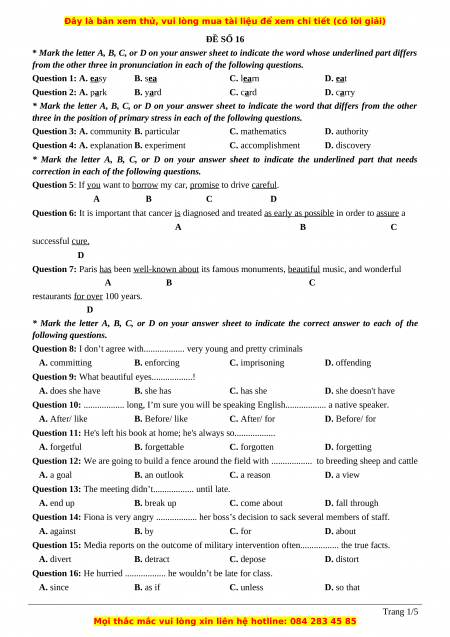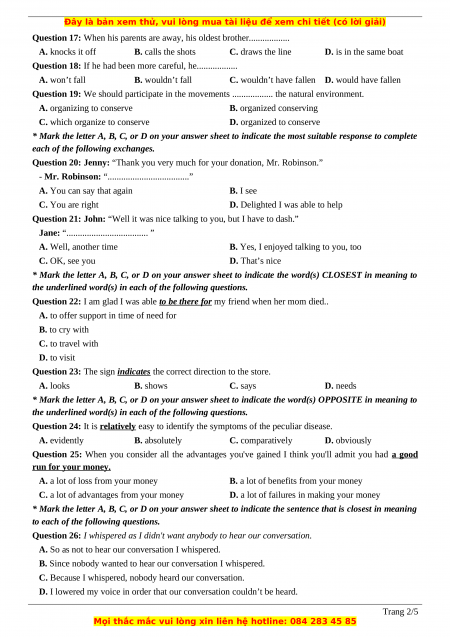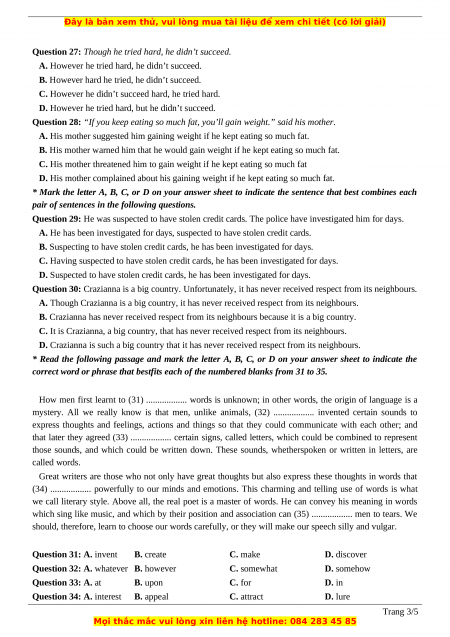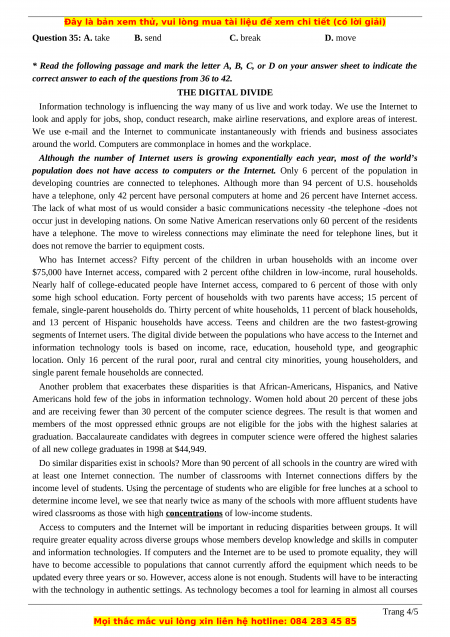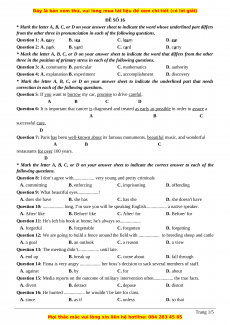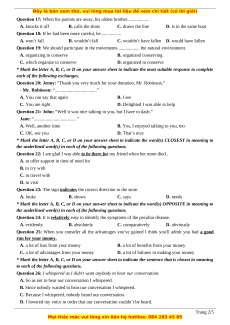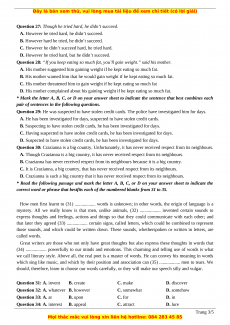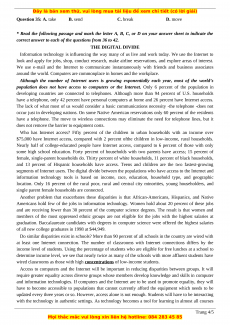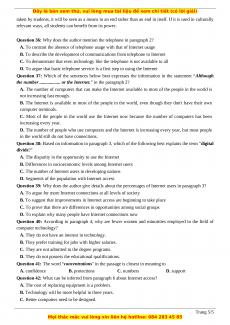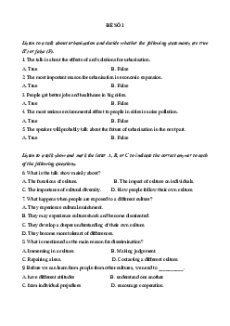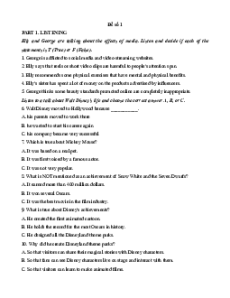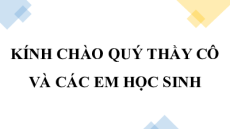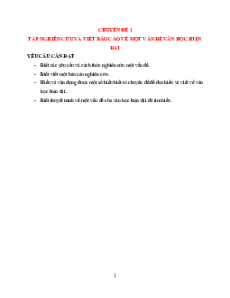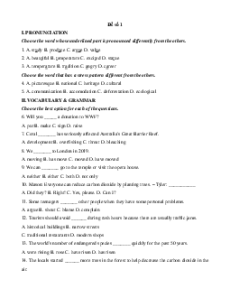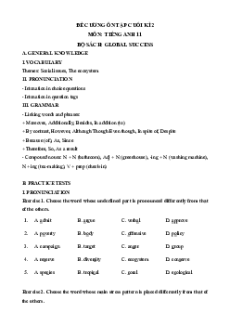ĐỀ SỐ 16
* Mark the letter A, B, C, or D on your answer sheet to indicate the word whose underlined part differs
from the other three in pronunciation in each of the following questions.
Question 1: A. easy B. sea C. learn D. eat
Question 2: A. park B. yard C. card D. carry
* Mark the letter A, B, C, or D on your answer sheet to indicate the word that differs from the other
three in the position of primary stress in each of the following questions.
Question 3: A. community B. particular C. mathematics D. authority
Question 4: A. explanation B. experiment C. accomplishment D. discovery
* Mark the letter A, B, C, or D on your answer sheet to indicate the underlined part that needs
correction in each of the following questions.
Question 5: If you want to borrow my car, promise to drive careful. A B C D
Question 6: It is important that cancer is diagnosed and treated as early as possible in order to assure a A B C successful cure. D
Question 7: Paris has been well-known about its famous monuments, beautiful music, and wonderful A B C
restaurants for over 100 years. D
* Mark the letter A, B, C, or D on your answer sheet to indicate the correct answer to each of the following questions.
Question 8: I don’t agree with.................. very young and pretty criminals A. committing B. enforcing C. imprisoning D. offending
Question 9: What beautiful eyes..................! A. does she have B. she has C. has she D. she doesn't have
Question 10: .................. long, I’m sure you will be speaking English.................. a native speaker. A. After/ like B. Before/ like C. After/ for D. Before/ for
Question 11: He's left his book at home; he's always so.................. A. forgetful B. forgettable C. forgotten D. forgetting
Question 12: We are going to build a fence around the field with .................. to breeding sheep and cattle A. a goal B. an outlook C. a reason D. a view
Question 13: The meeting didn’t.................. until late. A. end up B. break up C. come about D. fall through
Question 14: Fiona is very angry .................. her boss’s decision to sack several members of staff. A. against B. by C. for D. about
Question 15: Media reports on the outcome of military intervention often................. the true facts. A. divert B. detract C. depose D. distort
Question 16: He hurried .................. he wouldn’t be late for class. A. since B. as if C. unless D. so that Trang 1/5
Question 17: When his parents are away, his oldest brother.................. A. knocks it off B. calls the shots C. draws the line D. is in the same boat
Question 18: If he had been more careful, he.................. A. won’t fall B. wouldn’t fall
C. wouldn’t have fallen D. would have fallen
Question 19: We should participate in the movements .................. the natural environment.
A. organizing to conserve B. organized conserving
C. which organize to conserve
D. organized to conserve
* Mark the letter A, B, C, or D on your answer sheet to indicate the most suitable response to complete
each of the following exchanges.
Question 20: Jenny: “Thank you very much for your donation, Mr. Robinson.”
- Mr. Robinson: “....................................”
A. You can say that again B. I see C. You are right
D. Delighted I was able to help
Question 21: John: “Well it was nice talking to you, but I have to dash.”
Jane: “.................................... ” A. Well, another time
B. Yes, I enjoyed talking to you, too C. OK, see you D. That’s nice
* Mark the letter A, B, C, or D on your answer sheet to indicate the word(s) CLOSEST in meaning to
the underlined word(s) in each of the following questions.
Question 22: I am glad I was able to be there for my friend when her mom died..
A. to offer support in time of need for B. to cry with C. to travel with D. to visit
Question 23: The sign indicates the correct direction to the store. A. looks B. shows C. says D. needs
* Mark the letter A, B, C, or D on your answer sheet to indicate the word(s) OPPOSITE in meaning to
the underlined word(s) in each of the following questions.
Question 24: It is relatively easy to identify the symptoms of the peculiar disease. A. evidently B. absolutely C. comparatively D. obviously
Question 25: When you consider all the advantages you've gained I think you'll admit you had a good run for your money.
A. a lot of loss from your money
B. a lot of benefits from your money
C. a lot of advantages from your money
D. a lot of failures in making your money
* Mark the letter A, B, C, or D on your answer sheet to indicate the sentence that is closest in meaning
to each of the following questions.
Question 26: I whispered as I didn't want anybody to hear our conversation.
A. So as not to hear our conversation I whispered.
B. Since nobody wanted to hear our conversation I whispered.
C. Because I whispered, nobody heard our conversation.
D. I lowered my voice in order that our conversation couldn’t be heard. Trang 2/5
Question 27: Though he tried hard, he didn’t succeed.
A. However he tried hard, he didn’t succeed.
B. However hard he tried, he didn’t succeed.
C. However he didn’t succeed hard, he tried hard.
D. However he tried hard, but he didn’t succeed.
Question 28: “If you keep eating so much fat, you’ll gain weight.” said his mother.
A. His mother suggested him gaining weight if he kept eating so much fat.
B. His mother warned him that he would gain weight if he kept eating so much fat.
C. His mother threatened him to gain weight if he kept eating so much fat
D. His mother complained about his gaining weight if he kept eating so much fat.
* Mark the letter A, B, C, or D on your answer sheet to indicate the sentence that best combines each
pair of sentences in the following questions.
Question 29: He was suspected to have stolen credit cards. The police have investigated him for days.
A. He has been investigated for days, suspected to have stolen credit cards.
B. Suspecting to have stolen credit cards, he has been investigated for days.
C. Having suspected to have stolen credit cards, he has been investigated for days.
D. Suspected to have stolen credit cards, he has been investigated for days.
Question 30: Crazianna is a big country. Unfortunately, it has never received respect from its neighbours.
A. Though Crazianna is a big country, it has never received respect from its neighbours.
B. Crazianna has never received respect from its neighbours because it is a big country.
C. It is Crazianna, a big country, that has never received respect from its neighbours.
D. Crazianna is such a big country that it has never received respect from its neighbours.
* Read the following passage and mark the letter A, B, C, or D on your answer sheet to indicate the
correct word or phrase that bestfits each of the numbered blanks from 31 to 35.
How men first learnt to (31) .................. words is unknown; in other words, the origin of language is a
mystery. All we really know is that men, unlike animals, (32) .................. invented certain sounds to
express thoughts and feelings, actions and things so that they could communicate with each other; and
that later they agreed (33) .................. certain signs, called letters, which could be combined to represent
those sounds, and which could be written down. These sounds, whetherspoken or written in letters, are called words.
Great writers are those who not only have great thoughts but also express these thoughts in words that
(34) .................. powerfully to our minds and emotions. This charming and telling use of words is what
we call literary style. Above all, the real poet is a master of words. He can convey his meaning in words
which sing like music, and which by their position and association can (35) .................. men to tears. We
should, therefore, learn to choose our words carefully, or they will make our speech silly and vulgar.
Question 31: A. invent B. create C. make D. discover
Question 32: A. whatever B. however C. somewhat D. somehow
Question 33: A. at B. upon C. for D. in
Question 34: A. interest B. appeal C. attract D. lure Trang 3/5
Question 35: A. take B. send C. break D. move
* Read the following passage and mark the letter A, B, C, or D on your answer sheet to indicate the
correct answer to each of the questions from 36 to 42. THE DIGITAL DIVIDE
Information technology is influencing the way many of us live and work today. We use the Internet to
look and apply for jobs, shop, conduct research, make airline reservations, and explore areas of interest.
We use e-mail and the Internet to communicate instantaneously with friends and business associates
around the world. Computers are commonplace in homes and the workplace.
Although the number of Internet users is growing exponentially each year, most of the world’s
population does not have access to computers or the Internet. Only 6 percent of the population in
developing countries are connected to telephones. Although more than 94 percent of U.S. households
have a telephone, only 42 percent have personal computers at home and 26 percent have Internet access.
The lack of what most of us would consider a basic communications necessity -the telephone -does not
occur just in developing nations. On some Native American reservations only 60 percent of the residents
have a telephone. The move to wireless connections may eliminate the need for telephone lines, but it
does not remove the barrier to equipment costs.
Who has Internet access? Fifty percent of the children in urban households with an income over
$75,000 have Internet access, compared with 2 percent ofthe children in low-income, rural households.
Nearly half of college-educated people have Internet access, compared to 6 percent of those with only
some high school education. Forty percent of households with two parents have access; 15 percent of
female, single-parent households do. Thirty percent of white households, 11 percent of black households,
and 13 percent of Hispanic households have access. Teens and children are the two fastest-growing
segments of Internet users. The digital divide between the populations who have access to the Internet and
information technology tools is based on income, race, education, household type, and geographic
location. Only 16 percent of the rural poor, rural and central city minorities, young householders, and
single parent female households are connected.
Another problem that exacerbates these disparities is that African-Americans, Hispanics, and Native
Americans hold few of the jobs in information technology. Women hold about 20 percent of these jobs
and are receiving fewer than 30 percent of the computer science degrees. The result is that women and
members of the most oppressed ethnic groups are not eligible for the jobs with the highest salaries at
graduation. Baccalaureate candidates with degrees in computer science were offered the highest salaries
of all new college graduates in 1998 at $44,949.
Do similar disparities exist in schools? More than 90 percent of all schools in the country are wired with
at least one Internet connection. The number of classrooms with Internet connections differs by the
income level of students. Using the percentage of students who are eligible for free lunches at a school to
determine income level, we see that nearly twice as many of the schools with more affluent students have
wired classrooms as those with high concentrations of low-income students.
Access to computers and the Internet will be important in reducing disparities between groups. It will
require greater equality across diverse groups whose members develop knowledge and skills in computer
and information technologies. If computers and the Internet are to be used to promote equality, they will
have to become accessible to populations that cannot currently afford the equipment which needs to be
updated every three years or so. However, access alone is not enough. Students will have to be interacting
with the technology in authentic settings. As technology becomes a tool for learning in almost all courses Trang 4/5
Đề thi thử THPT Quốc Gia môn Tiếng Anh có đáp án ( đề 16 ) - thầy Bùi Văn Vinh
373
187 lượt tải
MUA NGAY ĐỂ XEM TOÀN BỘ TÀI LIỆU
CÁCH MUA:
- B1: Gửi phí vào TK:
1133836868- CT TNHH DAU TU VA DV GD VIETJACK - Ngân hàng MB (QR) - B2: Nhắn tin tới Zalo VietJack Official ( nhấn vào đây ) để xác nhận thanh toán và tải tài liệu - giáo án
Liên hệ ngay Hotline hỗ trợ: 084 283 45 85
Đề thi được cập nhật liên tục trong gói này từ nay đến hết tháng 6/2023. Chúng tôi đảm bảo đủ số lượng đề đã cam kết hoặc có thể nhiều hơn, tất cả có BẢN WORD, LỜI GIẢI CHI TIẾT và tải về dễ dàng.
Để tải tài liệu gốc về máy bạn click vào nút Tải Xuống ở trên!
Thuộc bộ (mua theo bộ để tiết kiệm hơn):
- Các đề thi được chọn lọc từ các trường Chuyên và Sở Giáo dục cả nước. Đảm bảo chất lượng, cấu trúc bám sát nhất với kì thì TN THPT 2023 môn Tiếng Anh.
- File word có lời giải chi tiết 100%.
- Đề thi mới sẽ được cập nhật tại gói này đến sát kì thi TN THPT 2023
- Mua trọn bộ sẽ tiết kiệm hơn tải lẻ 50%.
Đánh giá
4.6 / 5(373 )5
4
3
2
1
Trọng Bình
Tài liệu hay
Giúp ích cho tôi rất nhiều
Duy Trần
Tài liệu chuẩn
Rất thích tài liệu bên VJ soạn (bám sát chương trình dạy)
TÀI LIỆU BỘ BÁN CHẠY MÔN Tiếng Anh
Xem thêmTÀI LIỆU BỘ BÁN CHẠY Lớp 12
Xem thêmTài liệu bộ mới nhất

Đây là bản xem thử, vui lòng mua tài liệu để xem chi tiết (có lời giải)
ĐỀ SỐ 16
* Mark the letter A, B, C, or D on your answer sheet to indicate the word whose underlined part differs
from the other three in pronunciation in each of the following questions.
Question 1: A. easy B. sea C. learn D. eat
Question 2: A. park B. yard C. card D. carry
* Mark the letter A, B, C, or D on your answer sheet to indicate the word that differs from the other
three in the position of primary stress in each of the following questions.
Question 3: A. community B. particular C. mathematics D. authority
Question 4: A. explanation B. experiment C. accomplishment D. discovery
* Mark the letter A, B, C, or D on your answer sheet to indicate the underlined part that needs
correction in each of the following questions.
Question 5: If you want to borrow my car, promise to drive careful.
A B C D
Question 6: It is important that cancer is diagnosed and treated as early as possible in order to assure a
A B C
successful cure.
D
Question 7: Paris has been well-known about its famous monuments, beautiful music, and wonderful
A B C
restaurants for over 100 years.
D
* Mark the letter A, B, C, or D on your answer sheet to indicate the correct answer to each of the
following questions.
Question 8: I don’t agree with.................. very young and pretty criminals
A. committing B. enforcing C. imprisoning D. offending
Question 9: What beautiful eyes..................!
A. does she have B. she has C. has she D. she doesn't have
Question 10: .................. long, I’m sure you will be speaking English.................. a native speaker.
A. After/ like B. Before/ like C. After/ for D. Before/ for
Question 11: He's left his book at home; he's always so..................
A. forgetful B. forgettable C. forgotten D. forgetting
Question 12: We are going to build a fence around the field with .................. to breeding sheep and cattle
A. a goal B. an outlook C. a reason D. a view
Question 13: The meeting didn’t.................. until late.
A. end up B. break up C. come about D. fall through
Question 14: Fiona is very angry .................. her boss’s decision to sack several members of staff.
A. against B. by C. for D. about
Question 15: Media reports on the outcome of military intervention often................. the true facts.
A. divert B. detract C. depose D. distort
Question 16: He hurried .................. he wouldn’t be late for class.
A. since B. as if C. unless D. so that
Trang 1/5
Mọi thắc mắc vui lòng xin liên hệ hotline: 084 283 45 85

Đây là bản xem thử, vui lòng mua tài liệu để xem chi tiết (có lời giải)
Question 17: When his parents are away, his oldest brother..................
A. knocks it off B. calls the shots C. draws the line D. is in the same boat
Question 18: If he had been more careful, he..................
A. won’t fall B. wouldn’t fall C. wouldn’t have fallen D. would have fallen
Question 19: We should participate in the movements .................. the natural environment.
A. organizing to conserve B. organized conserving
C. which organize to conserve D. organized to conserve
* Mark the letter A, B, C, or D on your answer sheet to indicate the most suitable response to complete
each of the following exchanges.
Question 20: Jenny: “Thank you very much for your donation, Mr. Robinson.”
- Mr. Robinson: “....................................”
A. You can say that again B. I see
C. You are right D. Delighted I was able to help
Question 21: John: “Well it was nice talking to you, but I have to dash.”
Jane: “.................................... ”
A. Well, another time B. Yes, I enjoyed talking to you, too
C. OK, see you D. That’s nice
* Mark the letter A, B, C, or D on your answer sheet to indicate the word(s) CLOSEST in meaning to
the underlined word(s) in each of the following questions.
Question 22: I am glad I was able to be there for my friend when her mom died..
A. to offer support in time of need for
B. to cry with
C. to travel with
D. to visit
Question 23: The sign indicates the correct direction to the store.
A. looks B. shows C. says D. needs
* Mark the letter A, B, C, or D on your answer sheet to indicate the word(s) OPPOSITE in meaning to
the underlined word(s) in each of the following questions.
Question 24: It is relatively easy to identify the symptoms of the peculiar disease.
A. evidently B. absolutely C. comparatively D. obviously
Question 25: When you consider all the advantages you've gained I think you'll admit you had a good
run for your money.
A. a lot of loss from your money B. a lot of benefits from your money
C. a lot of advantages from your money D. a lot of failures in making your money
* Mark the letter A, B, C, or D on your answer sheet to indicate the sentence that is closest in meaning
to each of the following questions.
Question 26: I whispered as I didn't want anybody to hear our conversation.
A. So as not to hear our conversation I whispered.
B. Since nobody wanted to hear our conversation I whispered.
C. Because I whispered, nobody heard our conversation.
D. I lowered my voice in order that our conversation couldn’t be heard.
Trang 2/5
Mọi thắc mắc vui lòng xin liên hệ hotline: 084 283 45 85

Đây là bản xem thử, vui lòng mua tài liệu để xem chi tiết (có lời giải)
Question 27: Though he tried hard, he didn’t succeed.
A. However he tried hard, he didn’t succeed.
B. However hard he tried, he didn’t succeed.
C. However he didn’t succeed hard, he tried hard.
D. However he tried hard, but he didn’t succeed.
Question 28: “If you keep eating so much fat, you’ll gain weight.” said his mother.
A. His mother suggested him gaining weight if he kept eating so much fat.
B. His mother warned him that he would gain weight if he kept eating so much fat.
C. His mother threatened him to gain weight if he kept eating so much fat
D. His mother complained about his gaining weight if he kept eating so much fat.
* Mark the letter A, B, C, or D on your answer sheet to indicate the sentence that best combines each
pair of sentences in the following questions.
Question 29: He was suspected to have stolen credit cards. The police have investigated him for days.
A. He has been investigated for days, suspected to have stolen credit cards.
B. Suspecting to have stolen credit cards, he has been investigated for days.
C. Having suspected to have stolen credit cards, he has been investigated for days.
D. Suspected to have stolen credit cards, he has been investigated for days.
Question 30: Crazianna is a big country. Unfortunately, it has never received respect from its neighbours.
A. Though Crazianna is a big country, it has never received respect from its neighbours.
B. Crazianna has never received respect from its neighbours because it is a big country.
C. It is Crazianna, a big country, that has never received respect from its neighbours.
D. Crazianna is such a big country that it has never received respect from its neighbours.
* Read the following passage and mark the letter A, B, C, or D on your answer sheet to indicate the
correct word or phrase that bestfits each of the numbered blanks from 31 to 35.
How men first learnt to (31) .................. words is unknown; in other words, the origin of language is a
mystery. All we really know is that men, unlike animals, (32) .................. invented certain sounds to
express thoughts and feelings, actions and things so that they could communicate with each other; and
that later they agreed (33) .................. certain signs, called letters, which could be combined to represent
those sounds, and which could be written down. These sounds, whetherspoken or written in letters, are
called words.
Great writers are those who not only have great thoughts but also express these thoughts in words that
(34) .................. powerfully to our minds and emotions. This charming and telling use of words is what
we call literary style. Above all, the real poet is a master of words. He can convey his meaning in words
which sing like music, and which by their position and association can (35) .................. men to tears. We
should, therefore, learn to choose our words carefully, or they will make our speech silly and vulgar.
Question 31: A. invent B. create C. make D. discover
Question 32: A. whatever B. however C. somewhat D. somehow
Question 33: A. at B. upon C. for D. in
Question 34: A. interest B. appeal C. attract D. lure
Trang 3/5
Mọi thắc mắc vui lòng xin liên hệ hotline: 084 283 45 85

Đây là bản xem thử, vui lòng mua tài liệu để xem chi tiết (có lời giải)
Question 35: A. take B. send C. break D. move
* Read the following passage and mark the letter A, B, C, or D on your answer sheet to indicate the
correct answer to each of the questions from 36 to 42.
THE DIGITAL DIVIDE
Information technology is influencing the way many of us live and work today. We use the Internet to
look and apply for jobs, shop, conduct research, make airline reservations, and explore areas of interest.
We use e-mail and the Internet to communicate instantaneously with friends and business associates
around the world. Computers are commonplace in homes and the workplace.
Although the number of Internet users is growing exponentially each year, most of the world’s
population does not have access to computers or the Internet. Only 6 percent of the population in
developing countries are connected to telephones. Although more than 94 percent of U.S. households
have a telephone, only 42 percent have personal computers at home and 26 percent have Internet access.
The lack of what most of us would consider a basic communications necessity -the telephone -does not
occur just in developing nations. On some Native American reservations only 60 percent of the residents
have a telephone. The move to wireless connections may eliminate the need for telephone lines, but it
does not remove the barrier to equipment costs.
Who has Internet access? Fifty percent of the children in urban households with an income over
$75,000 have Internet access, compared with 2 percent ofthe children in low-income, rural households.
Nearly half of college-educated people have Internet access, compared to 6 percent of those with only
some high school education. Forty percent of households with two parents have access; 15 percent of
female, single-parent households do. Thirty percent of white households, 11 percent of black households,
and 13 percent of Hispanic households have access. Teens and children are the two fastest-growing
segments of Internet users. The digital divide between the populations who have access to the Internet and
information technology tools is based on income, race, education, household type, and geographic
location. Only 16 percent of the rural poor, rural and central city minorities, young householders, and
single parent female households are connected.
Another problem that exacerbates these disparities is that African-Americans, Hispanics, and Native
Americans hold few of the jobs in information technology. Women hold about 20 percent of these jobs
and are receiving fewer than 30 percent of the computer science degrees. The result is that women and
members of the most oppressed ethnic groups are not eligible for the jobs with the highest salaries at
graduation. Baccalaureate candidates with degrees in computer science were offered the highest salaries
of all new college graduates in 1998 at $44,949.
Do similar disparities exist in schools? More than 90 percent of all schools in the country are wired with
at least one Internet connection. The number of classrooms with Internet connections differs by the
income level of students. Using the percentage of students who are eligible for free lunches at a school to
determine income level, we see that nearly twice as many of the schools with more affluent students have
wired classrooms as those with high concentrations of low-income students.
Access to computers and the Internet will be important in reducing disparities between groups. It will
require greater equality across diverse groups whose members develop knowledge and skills in computer
and information technologies. If computers and the Internet are to be used to promote equality, they will
have to become accessible to populations that cannot currently afford the equipment which needs to be
updated every three years or so. However, access alone is not enough. Students will have to be interacting
with the technology in authentic settings. As technology becomes a tool for learning in almost all courses
Trang 4/5
Mọi thắc mắc vui lòng xin liên hệ hotline: 084 283 45 85

Đây là bản xem thử, vui lòng mua tài liệu để xem chi tiết (có lời giải)
taken by students, it will be seen as a means to an end rather than an end in itself. If it is used in culturally
relevant ways, all students can benefit from its power.
Question 36: Why does the author mention the telephone in paragraph 2?
A. To contrast the absence of telephone usage with that of Internet usage
B. To describe the development of communications from telephone to Internet
C. To demonstrate that even technology like the telephone is not available to all
D. To argue that basic telephone service is a first step to using the Internet
Question 37: Which of the sentences below best expresses the information in the statement “Although
the number .................. or the Internet.” in the paragraph 2?
A. The number of computers that can make the Internet available to most of the people in the world is
not increasing fast enough.
B. The Internet is available to most of the people in the world, even though they don't have their own
computer terminals.
C. Most of the people in the world use the Internet now because the number of computers has been
increasing every year.
D. The number of people who use computers and the Internet is increasing every year, but most people
in the world still do not have connections.
Question 38: Based on information in paragraph 3, which of the following best explains the term "digital
divide?"
A. The disparity in the opportunity to use the Internet
B. Differences in socioeconomic levels among Internet users
C. The number of Internet users in developing nations
D. Segments of the population with Internet access
Question 39: Why does the author give details about the percentages of Internet users in paragraph 3?
A. To argue for more Internet connections at all levels of society
B. To suggest that improvements in Internet access are beginning to take place
C. To prove that there are differences in opportunities among social groups
D. To explain why many people have Internet connections now
Question 40: According to paragraph 4, why are fewer women and minorities employed in the field of
computer technology?
A. They do not have an interest in technology.
B. They prefer training for jobs with higher salaries.
C. They are not admitted to the degree programs.
D. They do not possess the educational qualifications.
Question 41: The word “concentrations'' in the passage is closest in meaning to
A. confidence B. protections C. numbers D. support
Question 42: What can be inferred from paragraph 6 about Internet access?
A. The cost of replacing equipment is a problem.
B. Technology will be more helpful in three years.
C. Better computers need to be designed.
Trang 5/5
Mọi thắc mắc vui lòng xin liên hệ hotline: 084 283 45 85
